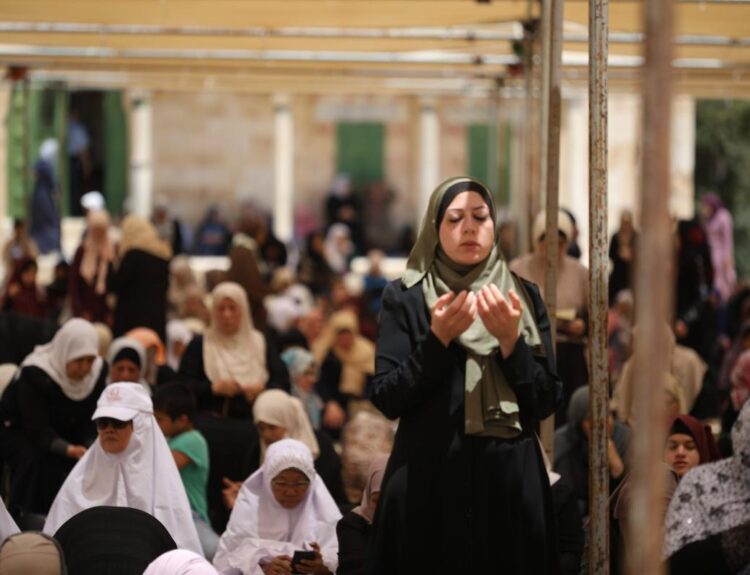The journey from this world to the next is a profound transition, one that every soul will inevitably experience. In Islam, this passage is marked by a series of sacred rituals and spiritual realities, each rooted in the Qur’an and Sunnah. Understanding these rites not only honors the deceased but also reminds the living of their own return to Allah ﷻ.
The Significance of Death in Islam
Death is not the end, but a gateway to the eternal life of the Hereafter. Allah ﷻ reminds us:
“Every soul shall taste death.”
Qur’an 3:185
كُلُّ نَفۡسࣲ ذَاۤىِٕقَةُ ٱلۡمَوۡتِۗ وَإِنَّمَا تُوَفَّوۡنَ أُجُورَكُمۡ یَوۡمَ ٱلۡقِیَـٰمَةِۖ فَمَن زُحۡزِحَ عَنِ ٱلنَّارِ وَأُدۡخِلَ ٱلۡجَنَّةَ فَقَدۡ فَازَۗ وَمَا ٱلۡحَیَوٰةُ ٱلدُّنۡیَاۤ إِلَّا مَتَـٰعُ ٱلۡغُرُورِ
Every soul will taste death, and you will only be given your [full] compensation on the Day of Resurrection. So he who is drawn away from the Fire and admitted to Paradise has attained [his desire]. And what is the life of this world except the enjoyment of delusion.
[3:185]
This certainty shapes the Islamic approach to death, emphasizing both dignity for the deceased and spiritual preparation for those left behind.
The Final Moments: What to Do When Death Approaches
Attending to the Dying
When a Muslim nears death, it is recommended for family and loved ones to gather, offer comfort, and encourage the recitation of the Shahadah (testimony of faith). The Prophet Muhammad ﷺ said:
“Prompt your dying ones to say: Lā ilāha illallāh.”
(Sahih Muslim 916)
If possible, the dying person should be laid on their right side facing the Qiblah, as this was the practice of the Prophet ﷺ and his companions (RA).
Immediately After Death: First Steps
Closing the Eyes and Supplication
Once death is certain, the eyes of the deceased are gently closed. The Prophet ﷺ did this for Abu Salamah (RA), saying:
“When the soul is taken, the eyesight follows it.”
(Sahih Muslim 920)
A supplication is made:
“O Allah, forgive [name], raise their rank among the guided, and grant them a successor from their descendants.”
Covering and Respect
The body is covered with a clean sheet, and preparations for the next steps begin. It is Sunnah to act quickly, as the Prophet ﷺ said:
“Hasten the funeral.”
(Sahih al-Bukhari 1315)
Ghusl (Washing the Body): Purification Before Burial
Who Performs Ghusl?
The washing is performed by close family or trusted members of the community of the same gender as the deceased.
The Method
- The body is placed on a table, covered for privacy, and the awrah (private area) is never exposed.
- The washer says “Bismillah” and uses a cloth to clean any impurities.
- Wudu (ablution) is performed for the deceased, as in prayer.
- The body is washed three times (or more if needed, always an odd number), starting with the right side and then the left, from head to toe.
- For women, the hair is loosened, washed, and braided in three plaits.
- Camphor or perfume may be used in the final wash.
- The body is dried and prepared for shrouding.
Shrouding (Kafan): Simple and Dignified
For Men
- Three white sheets are used, large enough to cover the body.
- The sheets are wrapped one by one, right side first, then left, and tied at the head, feet, and middle.
For Women
- Five pieces: two sheets, a long shirt, a waist wrapper, and a head veil.
- The body is wrapped, hair braided, and all parts covered modestly.
Extravagance is discouraged; simplicity and cleanliness are emphasized.
The Janazah (Funeral) Prayer: Collective Supplication
How It’s Performed
- The body is placed in front of the congregation, all facing the Qiblah.
- The Imam leads the prayer, and attendees stand in rows: men in front, then children, then women.
- The Janazah prayer is performed standing, with four takbirs (saying “Allahu Akbar”), followed by supplications for the deceased and all Muslims.
- No bowing or prostration occurs in this prayer.
The Importance
The Prophet ﷺ said:
“Whoever attends the funeral until the prayer is offered will have a reward equal to one qirat, and whoever attends until burial will have two qirats.”
(Sahih al-Bukhari 1325)
The Burial: Returning to the Earth
The Sunnah Method
- The body is carried in a silent procession to the graveyard.
- The grave is dug perpendicular to the Qiblah. The deceased is placed on their right side, facing the Qiblah.
- Those lowering the body say:
“Bismillahi wa ‘ala sunnat Rasul-Allah”
(“In the name of Allah and upon the Sunnah of the Messenger of Allah”)
(At-Tirmidhi 967, Sahih Sunan Abu Dawud 836). - The ties of the shroud are loosened, and a layer of wood or stones may be placed above the body to prevent direct contact with soil.
- Each person present throws three handfuls of earth into the grave, reciting:
Surah Taha – Verse 55
۞ مِنۡهَا خَلَقۡنَـٰكُمۡ وَفِیهَا نُعِیدُكُمۡ وَمِنۡهَا نُخۡرِجُكُمۡ تَارَةً أُخۡرَىٰ
From the earth We created you, and into it We will return you, and from it We will extract you another time.
[20:55]
- The grave is filled, and a marker may be placed for identification.
After the Burial
- It is Sunnah for those present to remain and make du‘a (supplication) for the deceased, asking Allah ﷻ to grant them firmness during the questioning in the grave.
The Questions of the Grave: The First Stage of the Hereafter
The Arrival of the Angels
After burial, two angels—Munkar and Nakir—visit the deceased. The Prophet ﷺ described:
“When a person is placed in his grave and his companions leave, he hears their footsteps. Two angels come to him, make him sit, and ask…”
(Sahih al-Bukhari 1338, Sahih Muslim 2870)
The Three Questions
- Who is your Lord?
- What is your religion?
- Who is your Prophet?
A believer will answer with ease:
“My Lord is Allah, my religion is Islam, and my Prophet is Muhammad ﷺ.”
For those who rejected faith, the answers will not come, and the grave becomes a place of hardship.
The Consequences
- The righteous experience peace, their grave expanded and filled with light.
- The sinful or disbelieving face constriction and torment, as described in authentic hadith (Sahih al-Bukhari 1374).
Common Questions About Islamic Death and Burial
1. Can women attend the burial?
Traditionally, men attend the burial, but in some communities, women may also be present, provided decorum is maintained.
2. Why is cremation forbidden in Islam?
Islam teaches bodily resurrection; cremation is seen as disrespectful and is strictly prohibited.
3. What is the purpose of the Janazah prayer?
It is a collective supplication for the deceased’s forgiveness and mercy, not a prayer with physical prostration.
4. How soon should burial take place?
Burial should occur as soon as possible, ideally within 24 hours, unless delayed by legal requirements.
5. What happens if the deceased cannot be washed?
If washing is impossible (due to injury or disease), tayammum (dry ablution) may be performed.
Contemporary Relevance: The Importance of Islamic Burial Rites Today
In a rapidly changing world, these timeless rituals offer comfort, dignity, and spiritual continuity. They unite families and communities in prayer, remind us of our shared destiny, and reinforce the values of humility and service. Preparing for death—by writing a will, settling debts, and nurturing faith—remains a vital part of Muslim life.
Conclusion: Reflections and a Call to Action
From the moment of death to the questioning in the grave, Islam provides a path of mercy, dignity, and hope. Each step—washing, shrouding, prayer, and burial—reflects the sanctity of human life and the certainty of the Hereafter. As Allah ﷻ says:
“Then to Him you will be returned.”
Qur’an 2:28
كَیۡفَ تَكۡفُرُونَ بِٱللَّهِ وَكُنتُمۡ أَمۡوَ ٰتࣰا فَأَحۡیَـٰكُمۡۖ ثُمَّ یُمِیتُكُمۡ ثُمَّ یُحۡیِیكُمۡ ثُمَّ إِلَیۡهِ تُرۡجَعُونَ
How can you disbelieve in Allah when you were lifeless and He brought you to life; then He will cause you to die, then He will bring you [back] to life, and then to Him you will be returned.
[2:28]
Let us honor our loved ones by fulfilling these rites with care, and prepare ourselves by living with sincerity and remembrance of Allah ﷻ. May our final journey be one of peace, and may we meet our Lord with hearts full of faith.
For further reading, consult your local imam or trusted Islamic authorities.







